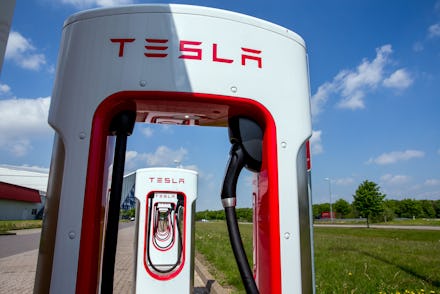Tesla Co-Founder Calls Competing Green Technology a "Scam"

It's no secret that Tesla CEO Elon Musk isn't a fan of hydrogen fuel cell technology — the other green power being considered by car manufacturers. The Tesla creator has called hydrogen fuel cell technology "silly" and "mind-bogglingly stupid."
Now, Tesla co-founder Marc Tarpenning is speaking out on hydrogen fuel cell cars. On Internet History Podcast, Tarpenning called hydrogen fuel cell vehicles "a scam."
Fuel cell technology has been around for well over a hundred years. Fuel cell cars run on the electricity created from bonding hydrogen and oxygen. Proponents of the technology tout its environmentally friendly attributes; the only byproduct of fuel cell vehicles is water and heat. However, not everyone is a fan of the technology.
The fuel-cell scam. "Hydrogen is uniquely bad," Tarpenning said. "There's a saying in the auto industry: Hydrogen is the future of transportation and always will be. And it's a scam as far as I can tell, because the energy equation is terrible," he said.
Tarpenning argues that while hydrogen is very abundant, it's difficult to get, compress and use in fuel. "It's abundant out there in the universe, not here," he said. "We live on a planet. You know, on a planet all the hydrogen is super reactive, it's bound up into everything. It's bound up into water, wood and everything else."
Essentially, he said, you have to expend a lot of energy to make hydrogen a viable electricity generator. Typically this is done through electrolysis; putting electricity into water separates the hydrogen and the oxygen. However, once the hydrogen is separated from the oxygen, it needs to be compressed, and that takes more energy. Electric batteries use energy more efficiently by comparison, according to Tarpenning.
The counterargument: The position in favor of fuel cell cars is focused squarely on consumers.
Electric car pioneer Toyota is currently focused on building out fuel cell cars — not all-electric vehicles. Despite building out a popular line of hybrid cars, Toyota has been called "the most anti-EV mass-market car company." The company says it doesn't think all-electric vehicles will catch on with consumers because they don't measure up to traditional gas-fueled cars on driving range and recharging times. In this sense, hydrogen powered vehicles have a leg up, according to Toyota.
Toyota's recently-introduced hydrogen fueled Mirai can go about 300 miles on one tank and takes about four minutes to refuel, according to USA Today.
But while a hydrogen car might be more consumer friendly, the lack of infrastructure is certainly not. Though the Mirai only needs to refuel around every 300 miles, there are astonishingly few stations where drivers can re-up.
Electric vehicles are still ahead. Meanwhile, refueling stations for electric cars are growing. Currently there are 13,491 charging stations and 33,162 charging outlets in the United States, according to the Alternative Fuels Data Center.
Fuel cell vehicles will also have to compete on price. The Toyota Mirai, which is currently only being sold in California, costs $58,335. Already, Nissan and Chevy offer electric vehicles for around $30,000. Plus, earlier this year, Tesla began taking orders for its $35,000 Model 3, giving consumers more realistic options for purchasing a car.